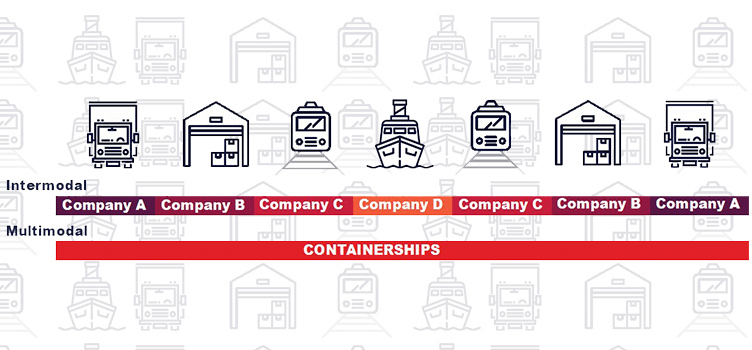2023-01-25
When talking about cargo transportation issues, two terms are usually used to describe the method: that is intermodal and multimodal transportation.At JIKEship, we're experts in multimodal, but we think you should know exactly what that means. So what exactly is the difference?
Both intermodal and multimodal transportation involve the use of more than one mode of transportation to move goods from their point of origin to their destination. This can be by truck, rail, barge, ship or any combination of them. Both may also mean several different carriers operating each leg of the journey.
The difference is in the contract.

In multimodal transport, one contract is responsible for the entire journey. One carrier is solely responsible for and ensures that the delivery is completed to your door, even if other carriers are used during the journey.
In intermodal transport, there is a separate contract for each leg of the journey. This means that there are multiple responsible entities for the successful delivery of the goods.
When using a carrier to deliver your cargo, make sure you understand the differences and communicate your needs properly with your provider to help eliminate any misunderstandings. So now we will look in more detail at the differences between intermodal and multimodal transportation.
Multimodal is defined as the use of multiple modes of transportation to move goods from their origin to their destination. In this case, each mode is operated by one or more carriers. However, under a single contract or bill of lading, a single carrier is responsible for a single trip. The same transportation carrier is responsible for transporting goods by all modes on all routes.
The difference between intermodal and multimodal transportation is the contract/bill of lading and the responsibility/liability to move of the transporting carrier.
If we review the example above, multimodal will have one company or one contract handling all the trips. This means that the same company will be responsible for shipping your cargo in all ways by all means.
This can be set up in several ways. One is that you can choose one company that owns all of these shipping methods. Another way is to set up a single contract for yourself, and that is to use one agent. The agent will do all the negotiations for you on the back end, and you will have only one contract to keep track of. The agent will also coordinate loading, unloading and delays.
There are several advantages to this approach, the first being less overhead for you. The company handling the multimodal shipments will be able to handle delays on cargo segments associated with other segments without your involvement. This method provides a one-stop shop, so each segment is handled by one provider, giving you peace of mind.
The advantages of multimodal transportation are a) Efficiency in shipment tracking: door-to-door monitoring with one transportation carrier is possible. b) Responsibility and obligation to access remote areas of the world with one transportation carrier. c) Delivery time efficiency; d) Shipper's Logistics coordination costs are minimized
Intermodal is defined as the use of multiple modes of transport to move goods from origin to destination. Each mode is operated by a different carrier, and each segment requires a separate contract. Multiple carriers for a single journey, with each leg handled by a separate transportation carrier.
Suppose you need to move a large amount of cargo to another station. The origin and destination are both on land and on different continents. This may mean that your cargo needs to be trucked to a rail yard, shipped by rail to a shipping port, and then shipped by ship to the next port overseas. It will then move by rail from the shipyard to another rail station and then by truck from the rail station to its final destination
When using intermodal, each segment of the shipment will be handled by a separate company, and you will have multiple contracts with each carrier to handle their specific segment of the shipment.
This has some advantages in that you can negotiate terms with each company separately. However, this means more overhead for you as you will need to keep track of multiple contracts with different suppliers. You may also be responsible for handling the coordination of delays, as one company will not be aware of possible delays with another company.
The advantages of intermodal transportation are a) Shippers can select carriers to take advantage of lower rates for each segment of transportation. b) Shippers gain the flexibility and professional handling of loading and unloading cargo at different ports. c) Choose an environmentally friendly carrier to reduce your carbon footprint. d) Increased safety of transported products. e) Shippers have greater access to equipment and can better control capacity and select transportation schedules.
The advantage of intermodal and multimodal transportation is that they combine the most efficient modes of transportation. This optimizes delivery times, reduces inventory costs and controls freight cost levels. It can also improve environmental sustainability and reduce the carbon footprint of transportation.
Whether your choice is intermodal and multimodal transportation , you need a transportation management system (TMS) to ensure visibility of door-to-door tracking. This will allow you to perform routing scenarios to determine the best overall total transportation cost with the best overall routed transit time. The TMS must be able to coordinate between transportation carriers and suppliers, as well as freight rates and contract management.
For more information on how rates or multimodal transportation can benefit your supply chain, contact a container ship specialist.
We use third-party cookies in order to personalise your experience.
Read our cookie policy